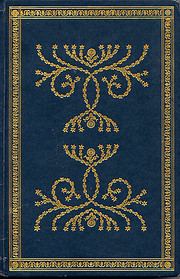

Carregue numa fotografia para ir para os Livros Google.
|
A carregar... Krigsdagbocker 1939-1945 (av Astrid Lindgren) [Imported] [Hardcover] (Swedish) (edição 2015)por Astrid Lindgren (Autor)
Informação Sobre a ObraA World Gone Mad: The Diaries of Astrid Lindgren, 1939-45 por Astrid Lindgren
 Nenhum(a) Ainda não há conversas na Discussão sobre este livro. The diaries started out strong, and I drew many comparisons to what’s happening today in our world. It was interesting to read about Lindgren’a life before Pippi Longstocking, and I wish she would have included more of her personal life in these diaries. At times, the entries seemed a little tedious and like a listing of news. The English edition does not have copies of the articles, cartoons, etc that she included in her diaries; rather there is a quick blurb describing them. While it would be laborious to translate I’m sure, to me, I felt like large pieces of information were missing, especially as a reader who may not be familiar with some of the places and wartime events. The WWII buff would enjoy this book. *I received a free copy of this book from the publisher in exchange for an honest review* Lindgren's diary, which she kept to make sense (if that's possible!) of the war, is especially interesting to read now. Since she lived in neutral Sweden, she wasn't being directly impacted by the war (or at least not at all to the extent most Europeans are), but she's still living through watching the world implode all about her. The diary is a full of those concerns and also the ones that may seem petty but are still there. I wish the English edition would have kept all the news clippings that the Swedish facsimile edition has (it was as much a diary as scrapbook of the war, apparently). There are clearly lots of articles about war issues I don't know or think much about (Sweden's worry about Finland being invaded by the USSR, first and foremost, horrible enough to them on its own, but also possibly meaning the Germans would invade through Sweden and bring the war to their doorstep). I would have liked to have the option to try and translate the clippings. The German edition of the war diaries of Astrid Lindgren is structured as if in two parts. On the one hand, Lindgren tells how she and her family experienced the war years. She emphasizes again and again that they were well, that they had enough to eat and that they did not have to worry too much. The food always had a great significance. On the other hand, she stuck newspaper clippings in her diary, as well as other notes and copies of her work during the war. This part was very interesting for me. It showed how she perceived the war as a Swede. In particular, as happened to the Scandinavian countries during the war. It also shows how early Lindgren was aware of what happened to the Jews. This book is a very exciting history lesson. I highly recommend it. It is a pity that the newspaper clippings are not printed in all language translations. sem críticas | adicionar uma crítica
Before she became internationally known for her Pippi Longstocking books, Astrid Lindgren was an aspiring author living in Stockholm with her family at the outbreak of the Second World War. The diaries she kept throughout the hostilities offer a civilian's, a mother's, and an aspiring writer's unique account of the devastating conflict. She emerges as a morally courageous critic of violence and war, as well as a deeply sensitive and astute observer of world affairs. We hear her thoughts about rationing, blackouts, the Soviet invasion of Finland, and the nature of evil, as well as of her personal heartbreaks, financial struggles, and trials as a mother and writer. Não foram encontradas descrições de bibliotecas. |
Current DiscussionsNenhum(a)Capas populares
 Google Books — A carregar... Google Books — A carregar...GénerosSistema Decimal de Melvil (DDC)839.7372Literature German literature and literatures of related languages Other Germanic literatures Swedish literature Swedish fiction 1900-1999 1900-1945Classificação da Biblioteca do Congresso dos EUA (LCC)AvaliaçãoMédia: (4.15) (4.15)
|
||||||||||||||||||||||||||||||||||||||||||||||||||||||||||||||||||||||||||||||||||||||||||||||||||||||||||||||||||||||||||||||||||||||
The diaries are a fascinating record of what the war looked like to an ordinary person reading the news in neutral Sweden — albeit one who read the news very carefully and was able to form a pretty good idea of the things she wasn't being told. It rather undermines our image of ourselves as a news-hungry generation. With only (local) newspapers and radio to fall back on, Lindgren knew a surprising amount about what was going on. And she had a huge amount of sympathy for the people it was happening to (especially in Finland, Norway, Denmark and the Baltic states) and a clear sense of how privileged she was to be living in the one place in Northern Europe that managed to stay out of the conflict. It was also fascinating to discover how the Pippi Longstocking stories emerged against the background of all the grief and destruction that was going on around her. (